|
|
|
Sort Order |
|
|
|
Items / Page
|
|
|
|
|
|
|
| Srl | Item |
| 1 |
ID:
189870
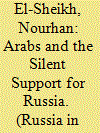

|
|
|
|
|
| Summary/Abstract |
The Arab attitude towards the Russian special military operation
in Ukraine is considered a departure from the trends that usually govern
Arab politics, which have generally been supportive of the United
States. This is due to the fact that a number of Arab countries are
historically U.S. strategic allies. It is also one of the unique situations
that have witnessed an Arab consensus, without pre-coordination in this
regard among Arab countries. Disagreements have always plagued
efforts to formulate unified Arab policies. In the case of the Russian
operation, every Arab country has taken its attitude in accordance with
its national interests, and so it all has led to a common Arab position
that is underscored by an understanding of Russian motives.
|
|
|
|
|
|
|
|
|
|
|
|
|
|
|
|
| 2 |
ID:
189860
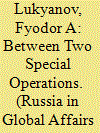

|
|
|
|
|
| Summary/Abstract |
In July 2021, six months before the start of the special military
operation (Russian official acronym SVO) in Ukraine, the Russian
president published an article titled “On the Historical Unity of
Russians and Ukrainians,” in which he actually substantiated in detail
the inevitability of the future campaign. “Step by step, Ukraine was
dragged into a dangerous geopolitical game aimed at turning it into
a barrier between Europe and Russia, a springboard against Russia.
Inevitably, there came a time when the concept of ‘Ukraine is not
Russia’ no longer suited the purpose. There was a need for the ‘anti-
Russia’ concept which we will never accept,” wrote Vladimir Putin. And
further he wrote:
|
|
|
|
|
|
|
|
|
|
|
|
|
|
|
|
| 3 |
ID:
189866
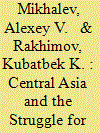

|
|
|
|
|
| Summary/Abstract |
The paper discusses the “struggle for Soviet legacy’ as a key concept for
understanding relations in Central Asia. This struggle is a path of dependent
development, in which the resources and values created in Soviet times
determine interstate relations in the 21st century. The authors argue that in
Central Asia this legacy rests mostly on the mega industries created during
the Soviet era, and national resources and practices of their distribution.
The paper concludes that in fact the struggle for Soviet legacy means
confrontation over the contours of new geoeconomics in Asia.
|
|
|
|
|
|
|
|
|
|
|
|
|
|
|
|
| 4 |
ID:
189869
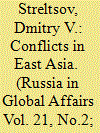

|
|
|
|
|
| Summary/Abstract |
While the threats that turned Europe into the most explosive part of the
world in the last century appear to be quite relevant for Asia, the European-
style security institutions do not seem to work for Asia. The key reasons
are the historically embedded roots of the insecurity, more acute territorial
divisions, specific (non-Western) understanding of security, and ethnically-
driven separatist and irredentist movements. Also, as deglobalization
increases and the international system becomes less and less manageable,
East Asian countries tend to push harder for pursuing an autonomous
security policy.
|
|
|
|
|
|
|
|
|
|
|
|
|
|
|
|
| 5 |
ID:
189865
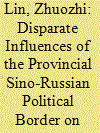

|
|
|
|
|
| Summary/Abstract |
The resurgence of sovereign states in a highly globalized modern world calls
for new approaches to border studies. The present paper suggests looking
at political, sociocultural and economic borders as constructs of dynamic
boundaries influencing people’s interactions. Through an oral history of a
mixed Sino-Russian ethnic community, and a narrative review of smugglers
and shuttle traders, this study examines how the flux of the political border
between the Heilongjiang1 province and the Russian Far East (HLJ-RFE political border) changed the sociocultural and economic borders during
three periods: the 1910s-1920s, the 1960s-1970s, and the 2000s-2010s, when
the political border was characterized as being porous, hostile, and friendly,
respectively. The study shows that the HLJ-RFE political border had a strong
impact on limiting the sociocultural demarcation, but a much weaker effect on
facilitating sociocultural interactions and economic regulations. The results
of the study demonstrate how a strong and friendly political border may lose
its potency when utilized by the local government to facilitate interethnic
integration. Furthermore, the study warrants an interdisciplinary approach to
border studies and a region-oriented methodology.
|
|
|
|
|
|
|
|
|
|
|
|
|
|
|
|
| 6 |
ID:
189867
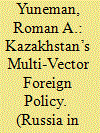

|
|
|
|
|
| Summary/Abstract |
The concept of multi-vector policy underlies Kazakhstan’s foreign policy
strategy. However the implementation of this strategy in the UN General
Assembly has not yet been studied. In this work, the author analyzes voting
cohesion of Kazakhstan and Russia, China, the U.S., and Germany in 2007-
2022, and also studies Kazakhstan’s behavior when the above countries
voted oppositely. Based on a quantitative and qualitative analysis of voting
on more than a thousand resolutions concerning international relations or
foreign policy, the author concludes that the main vector of this policy is
not Russia, which is formally a key ally of Kazakhstan, but China. Most often
Kazakhstan’s foreign policy position is identical to that of China (and least
of all to that of the United States). In addition, Kazakhstan avoids offering
explicit support to Russia on initiatives related to armed conflicts, including
the one in Ukraine.
|
|
|
|
|
|
|
|
|
|
|
|
|
|
|
|
| 7 |
ID:
189864
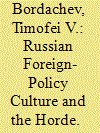

|
|
|
|
|
| Summary/Abstract |
This article scrutinizes the historical impact of the Mongolian Horde on
Russia’s foreign policy behavior. The author comes up with a hypothesis
that relations with the Horde were not only important for Russia during
the critical historical period of its formation, but also largely determined
its unique foreign-policy culture and practical implementation of Russian
foreign policy in subsequent periods. The author maintains that the key
element of this impact was peaceful integration of the powerful neighbor
which posed the biggest threat to the Great Russians for more than two
hundred years.
|
|
|
|
|
|
|
|
|
|
|
|
|
|
|
|
| 8 |
ID:
189871


|
|
|
| 9 |
ID:
189863
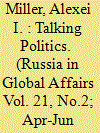

|
|
|
|
|
| Summary/Abstract |
This paper looks at Vladimir Putin’s public statements and articles devoted
specially to historical issues which were published in 2019 through 2021
(with reference to the first such article published in 2009). The Russian
President’s statements and extended texts on history are scrutinized in
this paper as political messages having a certain target audience and
political goals. The analysis has revealed a rapid evolution of Putin’s
approach to relations with the West in 2019-2021, from attempts to
reanimate the dialogue to a sharp confrontation.
|
|
|
|
|
|
|
|
|
|
|
|
|
|
|
|
| 10 |
ID:
189868


|
|
|
|
|
| Summary/Abstract |
This article discusses possible trajectories China may follow in its
development after the 20th Congress of the Communist Party of China.
Comparing various scenarios of China’s political development suggested
by acclaimed Western experts with Xi Jinping’s latest statements, the
author concludes that the chances for the country’s liberalization and
democratization are slim. China will have to complete modernization amid
growing confrontation with the West.
|
|
|
|
|
|
|
|
|
|
|
|
|
|
|
|
| 11 |
ID:
189862


|
|
|
|
|
| Summary/Abstract |
Starting with an overview of the ‘tyranny of values’ notion introduced by
Carl Schmitt, this article discusses how values are converted into political
goals and managed by societies. While both Schmitt and Robert Spaemann
emphasized the danger of ‘automatic enactment’ of values, today in a
mobilized society the situation aggravates as the differentiation between
a policy system based on violence and orders, and a culture system
offering common patterns for comprehending social life diminishes or
disappears completely. But this danger is often overlooked by the states,
particularly if the communities of states discover the community of
values, and their citizens willingly offer them their support in critical
situations.
|
|
|
|
|
|
|
|
|
|
|
|
|
|
|
|
| 12 |
ID:
189861


|
|
|
|
|
| Summary/Abstract |
In January 2003, when the first issue of Russia in Global Affairs was in the
making, the year 2023 seemed infinitely distant to us. To be more precise,
we had no idea what it would be like. The paradox of consciousness is that
now, on the contrary, it seems that 2003 was literally yesterday.
|
|
|
|
|
|
|
|
|
|
|
|
|
|
|
|
|
|
|
|
|